Russian Orthodox Church
~ English edition ~
ON DECEMBER 5, 2008, THE PATRIARCH OF THE RUSSIAN ORTHODOX CHURCH; HIS HOLINESS ALEXEI II, PATRIARCH FOR MOSCOW AND ALL RUSSIA; REPOSED IN THE LORD
Moswow, December 5, 2006
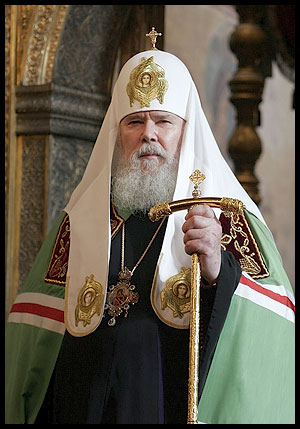
On Friday morning, December 5, 2008, His Holiness, Patriarch of Moscow and All Russia, Alexei II, departed to the Lord, after governing the Russian Orthodox Church für eighteen years. The Patriarch was eighty years old when he reposed his Patriarchal residence located in the Moscow suburb of Peredelkino. In accordance with the Rule of the Russian Orthodox Church, there will be an emergency meeting of the Holy Synod of Bischops, at wich a Locum Tenens of the Patriarchal Throne will be elected. The Locum Tenens will govern the Russian Chruch untill a new Patriarch is elected, and will head the Funeral Comission. The time für His Holiness, Patriarch Alexei' funeral servil will also be determined at the meeting of the Holy Synod. In accordance with the Rule, the new Patriarch of Moscow and All Russia must be chosen at a Local Ecclesiastical Council during the course of one-half of a year following the response of his predecessor, which shall be in the case no later than May, 2009. (Pravoslavie.ru)
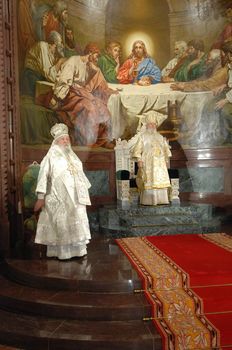
Alexei II (right) with Metropolit Lawr ( + 2008)
MOSCOW PATRIARCH ALEXEI II PRAISED FOR ROLE IN CHANGING TIMES
(Ecumenical News International, 5 December 2008/08-0977)
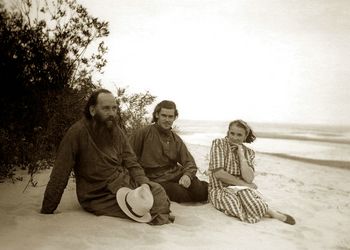
Moscow (Eni). Patriarch Alexei II (with parents) of the Russian Orthodox Church has died at his residence in Peredelkino, 40 kilometres from central Moscow, the church's Moscow Patriarchate has announced. No cause was given für the death on 5 December of the 79-year-old patriarch. The previous evening Alexei held a church service in one of Moscow's central cathedrale to mark a major religious holiday, the RIA-Novosti news agency reported. It said the church's ruling body, the Holy Synod, was to gather for an urgent meeting in Moscow on 6 December following the death of its leader. Alexej was elected Patriarch of Moscow and All Russia in June 1990 and he presided over the church during the post-communist and post-Soviet era. This not only saw greater freedom für the Russian Orthodox Church, and the restoration of battered church buildings, but an increase in the church's status as an institution at the very heart of the nation's cultural and political life (Foto: With his father)
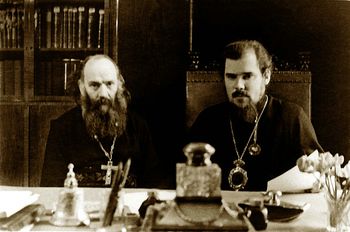
The Archbishop of Canterbury, Rowan Williams, who leads the worldwide Anglican Communion, said in a tribute to Alexei, "He was a leader of stature, with abundant experience, determination and courage, who guided his church with a steady hang through a profoundly challenging period of change in Russia's history."
From the 1960s, Alexei was seen as being one of the most vigorous supporters of the movements for church unity. He played a major role in theological dialogue with Protestant churches in Germany and Finnland, and held a seat on the World Council of churches' main governing body, its central commitee. But his most important ecumenical contribution was as a senior officer in the Conference of European Churches, beginning in 1964 as a member of its presidium and serving as its president from 1987 until 1992.
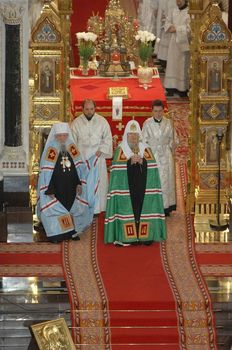
Alexei II (right) with Metropolit Lawr (2)
In 1989 he co-chaired the First European Ecumenical Assembly in Basel, Swizerland, which was the biggest offical gathering of European Anglican, Roman Catholic, Protestant and Orthodox churches since the 16th-century Protestant Reformation.
Alexei Mikhailovich Ridiger was born on 23 February 1929 in Talinn, the capital of Estonia. He was ordained a priest in 1950, and in 1961 was consecrated bishop of Talinn and Estonia. Within a few years he became archbishop and then metropolitan, serving as deputy chairperson of the Russian Orthodox Church's Department of External Church Relations, and as head of the educationscommitee which supervised the church's seminaries. From 1964 to 1886 he held the key post of chancellor of the Moswow Patriachate under two patriarchs, Alexei I. and Pimen.
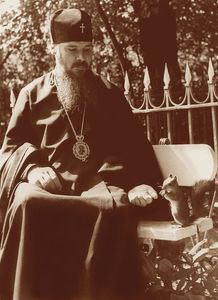
Even when he was appointed in 1986 to the Russian Orthodox Church's third most important see - Leningrad (now St. Petersburg) - Alexei continued to administer the Tallinn diocese, which he relingquished only after his election as patriarch of Moscow and All Russia. In the mid-1990s, his loyalty to Estonia suffered a severe blow when many Orthodox parishes in the newly-indepedent Baltic republic switched their allegiance from Moscow tho the Instanbul-based Ecumenical Patriarchate of Constantinople.
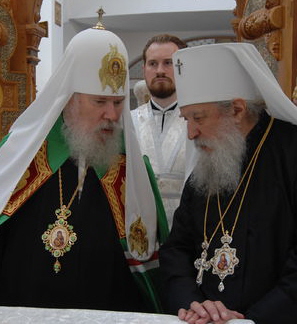
Patriarch Alexei II (+) with Metropolit Lawr (+)(3)
The conflict promted a temporary break in communion between Alexei and the Ecumenical Patriarch, Bartholomeos I. It was this dispute that led to the suspension in October 2008 by the Russian Orthodox Church of his membership in CEC in a dispute about the non-andmittance to the grouping of the Orthodox church in Estonia linked to the Moscow Patriachate.
(Andrei Zolotov contributed to this report - (c) www.eni.ch)
Moscow (ENI), 9. December 2008
MEDVEDEV, PUTIN JOIN PATRIARCHS FOR FUNERAL
OF RUSSIA'S ALEXEI II
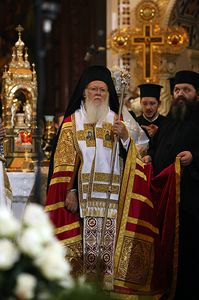
Ecumenical Patriarch Bartholomeos I of Constantinopel and Patriarch Ilia of Georgia both served at the funeral of Patriarch Alexei II of the Russian Orthodox Church in Moscow, a service also attended by President Dmitri A. Medvedev and Prime Minister Vladimir Putin... The service at the Cathedral of Christ the Saviour offered testimony to the Russian Patriarch as a unifier who brougth and held together a church that had been brutalised during the Soviet era. After the funeral service, Alexei was taken in a cortege through the Moscow streets and laid to rest at the Epiphany Cathedral. .. A third patriarch, Daniel of Romania, attended the funeral, as did dozens of other church dingitaries, many vested in Paschal white, as is the custom in the Orthodox church for clergy funerals.
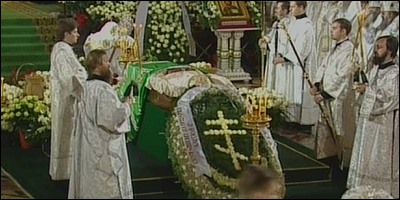
In sermon that opened the funeral service, Metropolit Kirill of Smolensk and Kaliningrad, ..., spoke of the late patriarch's efforts to overcome post-Soviet divisions. "(Alexei) always respected the sovereignty of states on the territory of the former USSR, but understood that these divisions cannot divide the peoples' unified system of values", said Kirill. Patriarch Alexei's efforts were devoted towards saving Russia, Kirill said, but always directed against the use of force. "His Holiness spoke in the language of eternity, understanding that only love can unite people, " said Kirill.
(Sophia Kishovsky)